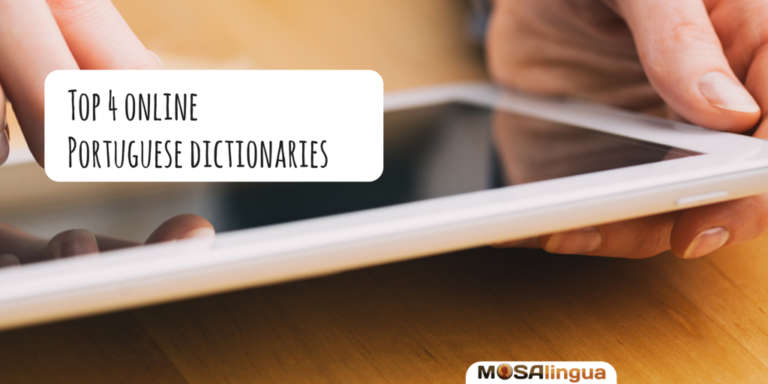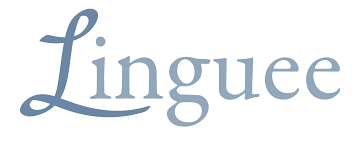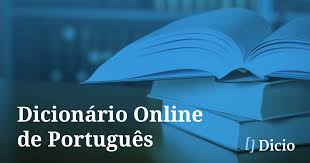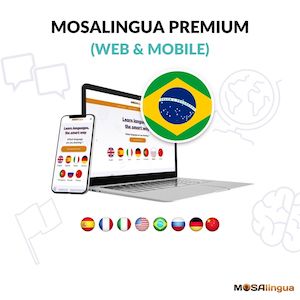Having a dictionary to learn a language is pretty much a necessity. However, I think we can all agree that we can’t always have a dictionary on hand. Online dictionaries can be very useful to identify proper words and phrases to allow you to better navigate a foreign language. So, in continuation with our series of articles on the best online dictionaries to learn languages (take a look at the Spanish list), here are the best online Portuguese dictionaries.
 Online Portuguese Dictionaries:
Online Portuguese Dictionaries:
1. Infopédia
Webpage: http://www.infopedia.pt/
General information:
- Infopédia is a website to reference when learning new languages. It is one of the biggest multimedia repositories of online monolingual and bilingual dictionaries.
- Infopédia contains various Portuguese dictionaries, including: the Portuguese language with and without spelling, Portuguese verbs, acronyms, abbreviations, toponymy, anthroponymy and medical terms.
- It also has 14 bilingual dictionaries to better utilize with your native language (available in English-Portuguese, Portuguese-Spanish).
- An extensive ensemble of material of encyclopedic, linguistics and graphs are available. All of which facilitate the investigation and the usage of its content in a scholarly, professional, and familiar context.
What you can expect? Definitions, syllabic divisions, phonetic notations, grammatical classification, the level of language the word pertains to (e.g. colloquial, figurative), geographical variations of usage (e.g. Brazil, U.S.A), thematic area in which the word is used (e.g. botanical, literature) and idiomatic expressions.
2. Linguee
Webpage: http://www.linguee.pt/
General information:
- Apart from finding definitions, this dictionary allows you to search words and expressions existing in bilingual texts. You will thus be able to find a selection of texts that come from external sources which will show you how to use a word or expression in the given context.
- It features more than 1,000 examples of translations compared to other dictionaries only giving a handful.
- It unites a selection of contextualized translations with a great variety of texts, the words searched are highlighted in yellow, with the sources of the texts always being visible.
What’s inside? Definitions, articles that use the searched words/expressions in an exact or similar way.
3. Dicio
Webpage: http://www.dicio.com.br/
General information:
- Dictionary developed by a team of Brazilian computer scientists and linguists.
- It features Portuguese definitions and gives meanings of 400,000 words from A to Z.
- Abbreviations, examples of words, word of the day, and a selection of the “most searched words” are also available.
What’s inside? Definitions, synonyms, antonyms, conjugation, and lists of the most common misused words in the Portuguese language.
4. Dicionário inFormal
Webpage: http://www.dicionarioinformal.com.br/
General information:
- Directory of words and colloquial expressions/jargon. This is the Portuguese version of Urban Dictionary, but its content is less irreverent and far ‘cleaner’.
- Anyone can edit the content of this dictionary. Words are defined by users in order to document the evolution of the Portuguese language.
- Launched to the public in 2006, it features over 150,000 definitions.
What’s inside? Definitions, common vernacular, synonyms, antonyms, examples, rhymes and verb conjugation.
Apart from online Portuguese dictionaries, there are many tools to learn Portuguese, such as the MosaLingua App. It includes tons of flashcards to memorize. They’re organized by skill level and topic and help you learn vocabulary easily and efficiently.
If you are learning Portuguese, I invite you to read this article to help you find a selection of the best resources to learn Portuguese.
Related posts:
Start improving your Portuguese today
Want to improve your Portuguese?
Good news: we can help!
More good news: you can get started for free! With your free trial, you can test drive the most effective method for learning Portuguese for the next 15 days !Vocabulary flashcards, videos with subtitles, audiobooks, articles adapted to your level – with MosaLingua Premium (Web & Mobile), you’ll have access to all this and more. Get started right now. It’s free—and risk-free—to try!





![10 Popular American English Slang Words [VIDEO]](https://www.mosalingua.com/en/files/2017/05/2-300x169.jpg)



Comments